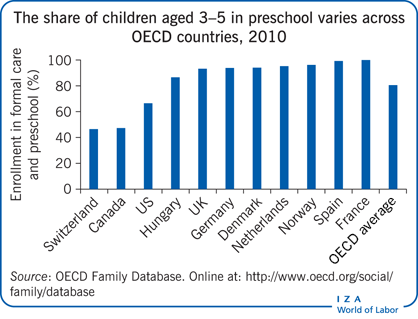Elevator pitch
Children from disadvantaged families have lower levels of school readiness when they enter school than do children from more advantaged families. Many countries have tried to reduce this inequality through publicly provided preschool. Evidence on the potential of these programs to reduce inequality in child development is now quite strong. Long-term studies of large publicly funded programs in Europe and Latin America, and newer studies on state and local prekindergarten programs implemented more recently in the US, find that the programs do improve outcomes for young children, particularly for those from disadvantaged families.

Key findings
Pros
Small model preschool programs improve child outcomes, especially for children from disadvantaged families.
Large public programs delivered at scale improve outcomes for children from disadvantaged families.
Preschool programs raise children’s school readiness.
The benefits of high-quality preschool programs persist into adolescence or young adulthood and, in most cases, are larger for more disadvantaged children.
High-quality preschool pays for itself, both by raising students’ overall achievement and by reducing inequality of achievement.
Cons
High-quality preschool programs are expensive.
Highly educated and well-trained preschool staff and reasonable class sizes and teacher–student ratios are required for high-quality preschool.
Results of studies of the effects of preschool programs may not be generalizable across countries.
As children enter school more ready to learn, schools need to be positioned to support and build on those gains.
Evidence is stronger with regard to positive short-term effects; but benefits are not always maintained in the long term.